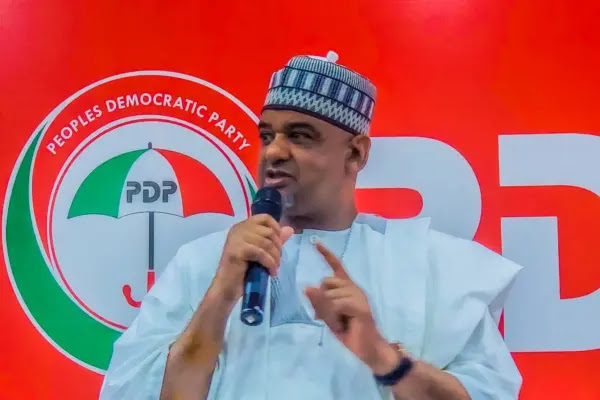In a landmark move aimed at revolutionizing Nigeria’s education sector, the Federal Government has launched the Teacher Ethics and Criminal Record Verification Framework, a policy that mandates comprehensive ethics screening and criminal background checks for all teachers in both public and private schools before they can be employed. Unveiled on Monday, August 25, 2025, by the Minister of Education, Dr. Tunji Alausa, in Abuja, the initiative was announced during the launch of the Teachers’ Registration Council of Nigeria (TRCN) digital portal and its new strategic vision for the teaching profession. This sweeping reform is designed to restore dignity, professionalism, and accountability to Nigeria’s education system, addressing longstanding challenges such as unqualified personnel, impersonation, and ethical lapses in the classroom.
This report provides an in-depth exploration of the policy, its implications, the role of the TRCN digital portal, and the broader context of Nigeria’s education reforms, while highlighting stakeholder reactions and the potential impact on the nation’s future.
The Policy Unveiled: A New Era for Teacher Accountability
The Teacher Ethics and Criminal Record Verification Framework represents a bold step toward ensuring that only individuals of sound moral character and professional competence are entrusted with educating Nigeria’s youth. Speaking at the launch event in Abuja, Dr. Tunji Alausa emphasized that the policy is a cornerstone of the Federal Government’s efforts to restore credibility to the teaching profession and elevate the quality of education across the country. “No teacher, whether in public or private institutions, will henceforth be employed without undergoing ethics screening and criminal background checks,” Alausa declared. “Private school owners will also be required to verify the TRCN registration and ethical clearance of their teachers.”
The framework is part of a broader set of reforms aimed at addressing systemic issues within Nigeria’s education sector, which has long grappled with challenges such as inadequate teacher training, low accountability, and poor learning outcomes. By mandating ethics screening and criminal background checks, the government seeks to safeguard the integrity of the classroom, ensuring that teachers are not only qualified but also uphold the highest standards of moral and professional conduct. The policy applies to all levels of education, from primary to secondary schools, and covers both public and private institutions, marking a significant departure from previous practices where oversight was often inconsistent, particularly in the private sector.
Alausa explained that the framework would be integrated into the newly launched TRCN digital portal, a state-of-the-art platform designed to streamline teacher registration, licensing, and monitoring. The portal, which leverages advanced technology, including artificial intelligence (AI), will enable real-time verification of teachers’ credentials, ethical clearances, and criminal records. This digital infrastructure is expected to enhance transparency, reduce instances of impersonation and forgery, and ensure that only qualified individuals are employed as teachers. “This policy will safeguard the integrity of the classroom by ensuring that only individuals of sound moral character and proven ethical conduct are entrusted with nurturing future generations,” Alausa stated, underscoring the government’s commitment to protecting students and elevating educational standards.
The TRCN Digital Portal: A Technological Leap Forward
The launch of the TRCN digital portal marks a significant milestone in Nigeria’s efforts to modernize its education system. Developed in collaboration with international partners, including the British High Commission, the portal is designed to serve as a centralized platform for managing teacher registration, licensing, and professional development. Dr. Ronke Soyombo, the TRCN Registrar, highlighted the portal’s transformative potential, noting that it includes features such as AI-powered lesson planning tools, real-time monitoring of teacher compliance, and mechanisms for conducting criminal background checks and ethical investigations.
The portal’s capabilities extend beyond verification to include tools that empower teachers to improve their practice. For instance, the AI-powered lesson planning tools are designed to assist teachers in creating effective, student-centered lesson plans aligned with the national curriculum. Additionally, the portal facilitates the establishment of teachers’ investigation panels across all 36 states and the Federal Capital Territory (FCT), enabling swift responses to allegations of misconduct or unethical behavior. These panels, supported by the digital infrastructure, will ensure that complaints against teachers are thoroughly investigated, with appropriate sanctions applied where necessary.
Soyombo also used the occasion to shed light on Nigeria’s ongoing education challenges, revealing that approximately 30 percent of school-age children in the country are still unable to read and write. This statistic underscores the urgency of the government’s reforms, as literacy and numeracy are foundational to economic development and social mobility. By improving teacher quality through rigorous screening and continuous professional development, the TRCN aims to address these gaps and ensure that every child has access to quality education. “The portal is a game-changer,” Soyombo stated. “It not only ensures accountability but also equips teachers with the tools they need to succeed in the classroom.”
The Context: Nigeria’s Education Crisis
Nigeria’s education system has faced significant challenges for decades, including inadequate funding, poor infrastructure, and a shortage of qualified teachers. According to UNESCO, Nigeria has one of the highest numbers of out-of-school children globally, with over 10 million children of primary school age not enrolled. The quality of education in schools is also a concern, with many students failing to achieve basic literacy and numeracy skills. These challenges are compounded by regional disparities, with northern states facing higher rates of illiteracy and school dropout compared to the southern regions.
The teaching profession, once regarded as a noble calling, has also suffered from declining prestige and accountability. Issues such as unqualified teachers, impersonation, and ethical breaches have undermined public trust in the education system. In some cases, teachers have been found to lack the necessary qualifications or engage in misconduct, including absenteeism and exploitation of students. The private school sector, which has grown rapidly in recent years, has been particularly susceptible to these issues due to lax regulation and oversight.
The Federal Government’s introduction of the Teacher Ethics and Criminal Record Verification Framework is a direct response to these challenges. By institutionalizing mandatory screening, the government aims to weed out unqualified and unethical individuals from the profession while restoring public confidence in teachers. The policy also aligns with President Bola Ahmed Tinubu’s broader education agenda, which emphasizes access, quality, and accountability as key pillars of national development.
International Support and Collaboration
The launch of the TRCN digital portal and the verification framework has been bolstered by international support, particularly from the British High Commission. Ian Attfield, Senior Education Adviser at the Commission, attended the launch event and reaffirmed the UK government’s commitment to supporting Nigeria’s education reforms. Attfield described Nigeria’s education system as “complex,” given its mix of public, private, and faith-based schools, but praised the TRCN’s efforts to create an integrated system that combines accountability with incentives for teachers.
The collaboration between the TRCN and the British High Commission involved technical assistance in designing the digital portal, drawing on global best practices in education technology and teacher management. Attfield commended the initiative as “herculean but achievable,” noting that the portal’s ability to verify credentials and monitor teacher performance in real time could serve as a model for other developing countries. “The UK is proud to partner with Nigeria in this transformative journey,” he said, highlighting the potential for the reforms to improve learning outcomes and strengthen the education system.
The involvement of international partners underscores the global significance of Nigeria’s education challenges. As Africa’s most populous country and a key player in the continent’s economy, Nigeria’s ability to educate its youth has far-reaching implications for regional stability and development. The support of organizations like the British High Commission reflects a shared recognition of the need to invest in education as a driver of progress.
Implications for the Teaching Profession
The Teacher Ethics and Criminal Record Verification Framework is poised to have a profound impact on the teaching profession in Nigeria. By setting a high standard for entry into the profession, the policy aims to elevate the status of teachers, making the role more attractive to qualified and dedicated individuals. The mandatory screening process is expected to deter unqualified candidates and those with criminal histories, ensuring that only individuals with the requisite skills and moral integrity are entrusted with educating students.
For private school owners, the policy introduces new responsibilities, as they will be required to verify the TRCN registration and ethical clearance of their teachers. This requirement addresses a longstanding gap in the private education sector, where oversight has often been minimal. By bringing private schools under the same accountability framework as public institutions, the government is signaling its commitment to uniform standards across the education system.
The TRCN digital portal also offers opportunities for professional development, as teachers can access resources and training through the platform. The inclusion of AI-powered tools, such as lesson planning aids, reflects a forward-thinking approach to teacher support, recognizing that quality education requires both accountability and empowerment. By equipping teachers with modern tools and resources, the government aims to improve classroom instruction and student outcomes.
However, the implementation of the framework is not without challenges. The logistics of conducting ethics screening and criminal background checks for thousands of teachers across the country will require significant resources, including trained personnel, funding, and coordination between federal and state agencies. Additionally, the establishment of investigation panels in every state must be accompanied by clear guidelines to ensure fairness and transparency in handling allegations of misconduct.
Stakeholder Reactions and Perspectives
The launch of the verification framework has elicited a range of reactions from stakeholders in Nigeria’s education sector. Teachers’ unions, such as the Nigeria Union of Teachers (NUT), have expressed cautious optimism about the policy. “We welcome any initiative that promotes professionalism and protects the integrity of our profession,” said NUT President, Comrade Audu Amba. “However, the government must ensure that the screening process is fair and does not unfairly target teachers or delay employment.”
Education advocates have also praised the policy, viewing it as a critical step toward addressing Nigeria’s learning crisis. “For too long, we’ve allowed unqualified individuals to teach our children,” said Dr. Amina Yusuf, an education consultant based in Lagos. “This framework, if properly implemented, could transform the quality of education in Nigeria.” However, Yusuf also cautioned that the success of the policy depends on its enforcement and the government’s ability to address systemic issues like teacher remuneration and working conditions.
Parents and students, who are directly affected by the quality of teaching, have also weighed in on the policy. On platforms like X, many Nigerians expressed support for the framework, with some calling it a “game-changer” for the education system. “If teachers are properly vetted, we can trust that our children are in safe hands,” wrote one user. Others, however, raised concerns about potential bureaucratic delays and the cost of compliance for private schools, which could lead to higher school fees.
The private school sector, represented by organizations like the National Association of Proprietors of Private Schools (NAPPS), has acknowledged the need for accountability but urged the government to provide support during the transition. “We are committed to ensuring quality education, but the government must work with us to make this process seamless,” said NAPPS President, Yomi Otubela.
Challenges and Opportunities Ahead
While the Teacher Ethics and Criminal Record Verification Framework holds immense promise, its success will depend on effective implementation and sustained commitment from all stakeholders. Key challenges include:
Resource Allocation: Conducting ethics screening and criminal background checks on a national scale requires significant funding and infrastructure. The government must ensure that the TRCN and other agencies have the resources needed to carry out these tasks efficiently.
Capacity Building: The establishment of investigation panels and the use of AI-powered tools will require training for TRCN staff and other personnel involved in the process. Building this capacity will be critical to the policy’s success.
Public Awareness: Many teachers and school owners, particularly in rural areas, may be unaware of the new requirements. The government and TRCN must launch a robust awareness campaign to ensure compliance and understanding of the framework.
Equity and Access: The policy must be implemented in a way that does not disproportionately affect teachers in underserved regions or low-income private schools, where resources for compliance may be limited.
Despite these challenges, the framework presents significant opportunities to transform Nigeria’s education system. By ensuring that only qualified and ethical teachers are employed, the policy can improve learning outcomes, reduce dropout rates, and restore public confidence in education. The TRCN digital portal, with its advanced features, has the potential to position Nigeria as a leader in education technology in Africa, setting a model for other countries to follow.
The Broader Vision: Transforming Nigeria’s Education System
The Teacher Ethics and Criminal Record Verification Framework is part of a broader vision to reposition Nigeria’s education system as a driver of national development. Under President Tinubu’s administration, the government has prioritized education as a key pillar of its “Renewed Hope” agenda, with initiatives aimed at increasing school enrollment, improving infrastructure, and enhancing teacher training. The framework complements other reforms, such as the Universal Basic Education (UBE) program and efforts to address the out-of-school children crisis.
By focusing on teacher quality, the government is addressing one of the root causes of poor learning outcomes. Research has consistently shown that teacher effectiveness is a critical determinant of student success, and the new policy aims to ensure that Nigeria’s teachers are equipped to deliver high-quality instruction. The integration of technology through the TRCN portal also aligns with global trends in education, where digital tools are increasingly used to enhance teaching and learning.
The collaboration with international partners like the British High Commission highlights the global stakes of Nigeria’s education reforms. As a country with a young and growing population, Nigeria’s ability to educate its citizens will shape its economic and social trajectory for decades to come. A well-educated workforce is essential for addressing challenges like unemployment, poverty, and insecurity, and the new framework is a step toward building that foundation.
Conclusion
The Federal Government’s launch of the Teacher Ethics and Criminal Record Verification Framework marks a transformative moment for Nigeria’s education system. By mandating ethics screening and criminal background checks for all teachers, the government is taking decisive action to ensure that only qualified and ethical individuals shape the minds of the nation’s youth. The TRCN digital portal, with its AI-powered tools and real-time monitoring capabilities, provides a robust platform for implementing this policy, while also empowering teachers to improve their practice.
The initiative, unveiled by Minister of Education Dr. Tunji Alausa on August 25, 2025, reflects a broader commitment to restoring dignity, professionalism, and accountability to the teaching profession. Supported by international partners like the British High Commission, the framework has the potential to address longstanding challenges in Nigeria’s education system, from unqualified teachers to ethical lapses. However, its success will depend on effective implementation, adequate resources, and collaboration with stakeholders across the public and private sectors.
As Nigeria looks to the future, the Teacher Ethics and Criminal Record Verification Framework represents a bold step toward building a stronger, more equitable education system. By prioritizing teacher quality and accountability, the government is laying the groundwork for a generation of students who are better equipped to succeed in a rapidly changing world. This reform, if sustained, could redefine the teaching profession and position Nigeria as a leader in education reform in Africa.






